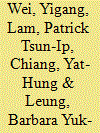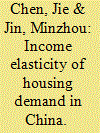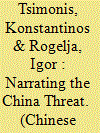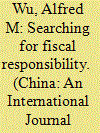|
|
|
Sort Order |
|
|
|
Items / Page
|
|
|
|
|
|
|
| Srl | Item |
| 1 |
ID:
109799


|
|
|
|
|
| Publication |
2012.
|
| Summary/Abstract |
China is gradually increasing its economic and commercial presence in Eastern Europe by signing bilateral agreements with countries that are still in transition, some of which are members of the European Union (EU).
|
|
|
|
|
|
|
|
|
|
|
|
|
|
|
|
| 2 |
ID:
175194


|
|
|
|
|
| Summary/Abstract |
To align this study with the scholarship on disaggregating the monolithic concept of nationalism in the Chinese context, the authors differentiate economic and cultural nationalisms, and conceptualise them as the manifestations of nationalistic sentiments in economic and cultural domains. Using data from the supplemental survey of the 2008 Chinese General Social Survey, findings have shown that economic and cultural nationalisms are weakly associated; age and education have greater effects on cultural nationalism than on economic nationalism; social status is negatively associated with economic nationalism but has no effect on cultural nationalism.
|
|
|
|
|
|
|
|
|
|
|
|
|
|
|
|
| 3 |
ID:
127772


|
|
|
|
|
| Publication |
2014.
|
| Summary/Abstract |
To curb price speculations and overheated investment in the real estate market, the mainland Chinese government has determined to tighten bank lending to the market in recent years, by resorting to administrative tools through specific real estate control policy. With hindsight, the market response seems to have invalidated the policy initiatives. This research is aimed at investigating the impediments to achieving the laudable policy objectives of using administrative credit controls. A series of research interviews with property practitioners unraveled prevalent evasive practices and illicit tactics adopted by developers to thwart policy effects. This study leads to a better understanding of the institutional backdrop behind the less-than-expected results of the real estate macro-control measures. To better steer the real estate market, effective monetary control requires both the government and industry to make concerted efforts and consistent headway towards a complete, transparent and responsive ensemble of institutional arrangements.
|
|
|
|
|
|
|
|
|
|
|
|
|
|
|
|
| 4 |
ID:
127773


|
|
|
|
|
| Publication |
2014.
|
| Summary/Abstract |
Since 1998, the Chinese housing market has played a fundamental role in driving macroeconomic stability and economic growth. This paper attempts to estimate the income elasticity of housing demand in Shanghai based on a household survey conducted by the National Bureau of Statistics of China in 2007. We utilize a two-stage model, which integrates analysis of both tenure choice and housing demand. Our findings indicate that both permanent and current income has significant influence on tenure choice in Shanghai, and that owner-occupiers' permanent income elasticity of housing demand in Shanghai is between 0.375 and 0.447. Our research also suggests that migrant homeowners have higher permanent income elasticity than Shanghai natives and that most Chinese households are liquidity constrained with regards to obtaining homeownership. We also find that permanent income elasticity increases with age. Finally, the existence of an urban-rural and regional difference is shown.
|
|
|
|
|
|
|
|
|
|
|
|
|
|
|
|
| 5 |
ID:
175841


|
|
|
|
|
| Summary/Abstract |
This article unpacks the discursive construction of a European ‘China Threat’ narrative by European think tanks. We theorise think tanks as crucial actors in the securitising process, especially at the initial stages where ideas and reference frames are formed. Despite having no decision-making authority, think tanks participate as securitising actors in the process of idea formation and bidding, articulating a securitised frame of reference for policy makers. In the case of EU–China relations, we observe an emerging congruence between think tanks and policy makers that engage in a non-linear construction of a ‘China Threat’ policy frame. In this article, we review key think tank reports that are circulated through official EU policy channels and deconstruct the assumptions behind the ‘China Threat’ discourse. We first argue that, analytically, their securitising attempt is characterised by a distorted representation of Chinese economic activities abroad, including those falling under the Belt and Road Initiative. Second, politically, this narrative produces a distorted notion of European politics where pluralism is weakness and disagreement dissent, promoting a view of the EU where ‘responsible’ core countries must contain the periphery’s ‘opportunism’. Third, we contend that despite defending ‘Europeanness’ as the epitome of human rights and democracy, the securitisation of Chinese FDI rests on othering practices that risk undermining those very ideals. By identifying the problematic undertones of this securitising effort, we call for a fact-based and pluralistic debate on the challenges of Chinese investment and financing for European economies and societies.
|
|
|
|
|
|
|
|
|
|
|
|
|
|
|
|
| 6 |
ID:
130584


|
|
|
|
|
| Publication |
2014.
|
| Summary/Abstract |
The 2008-2009 global financial crisis has made budget management and fiscal responsibility more imperative in many developed economies. A budget crisis has not occurred in emerging economies such as China. However, in China, the demands of fiscal responsibility have increased against the backdrop of bulging government revenues in recent years. Over the past decade, the Chinese government has started to promote self-constrained bureaucracy and strengthen its fiscal responsibility and accountability in budget formulation and implementation. The 1999 budget reform that aimed to improve fiscal responsibility was hailed a success by previous literature. Drawing on field research in five counties in China between 2008 and 2010, it is argued that though some achievements have been made, the budget reform has not substantially improved both accountability and transparency within the bureaucracy. The implication of this study is that top-down, supply-side reforms led by the state may not be effective.
|
|
|
|
|
|
|
|
|
|
|
|
|
|
|
|
|
|
|
|
|